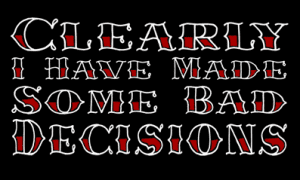
Being a subordinate is an inherently essential skill for first responders. Borrowing a line from the movie A Few Good Men “We follow orders or people die.” This is true. However, consistent with the outcome of the movie, sometimes BECAUSE we follow orders people die. An example of this would be when a decision maker has flawed situational awareness but does not know it. This segment addresses the dangerous outcomes that can arise from being a loyal follower.
Dangerous Mindsets
The potentially dangerous mindsets I will be writing about in this series include:
- The starter (a.k.a., the new member)
- The subordinate (a.k.a., the loyal follower)
- The specialist (a.k.a., the expert or ‘know-it-all’)
- The superior (a.k.a., the BOSS!)
- The stubborn (a.k.a., the defiant)
- The silent (a.k.a., the shy one)
- The superman (a.k.a., the unstoppable)
- The slacker (a.k.a., the complacent)
- The synergist (a.k.a., the like-minded)
This article addresses the subordinate.
So I don’t get off on the wrong foot with the readers, this article is not a damnation of formal authority. I have always been a strong supporter of the chain of command and the essential need for subordinates to follow the direct orders of superior officers. No where is this concept more critical than on an emergency scene. If someone does not follow orders, people can die. There no place for blatant insubordination.
Good leaders – Bad Decisions
 Is it possible for a good leader to make a bad decision? Whether you are in a formal leadership position or not, I hope your answer to this questions is a resounding YES! To think otherwise is to believe a leader (yourself or someone else) is a flawless decision maker. This simply is an unrealistic expectation. In no environment is someone’s decision quality at greater risk of error than in the high-risk, high consequence environment of emergency scenes. Rregardless of the level of training or experience, all humans are subject to error.
Is it possible for a good leader to make a bad decision? Whether you are in a formal leadership position or not, I hope your answer to this questions is a resounding YES! To think otherwise is to believe a leader (yourself or someone else) is a flawless decision maker. This simply is an unrealistic expectation. In no environment is someone’s decision quality at greater risk of error than in the high-risk, high consequence environment of emergency scenes. Rregardless of the level of training or experience, all humans are subject to error.
Loyal to the Death
 Some would say to be subordinate is to be loyal. In fact, loyalty is a subordinate quality coveted by many leaders. Loyalty can be acquired in a variety of ways including building trust or by instilling fear. The loyal subordinate who follows out of trust may not question the decision of the leader because there is a level of trust that inhibits the follower from questioning the decision of the leader.
Some would say to be subordinate is to be loyal. In fact, loyalty is a subordinate quality coveted by many leaders. Loyalty can be acquired in a variety of ways including building trust or by instilling fear. The loyal subordinate who follows out of trust may not question the decision of the leader because there is a level of trust that inhibits the follower from questioning the decision of the leader.
A subordinate may also avoid calling into question the decisions of superiors out of fear. If the fear of retribution from the leader exceeds the fear of the consequence of performing the order, the order may be obeyed even if the consequences to the subordinate are catastrophic. This form of learned helplessness arising from fear can prevent a subordinate from making any statement in opposition to the leader’s wishes, on or off the emergency scene. Here’s a clue: If it is happening off the emergency scene, then it is almost guaranteed to happen on the emergency scene.
The Good Subordinate
A good subordinate does not follow blindly. Rather, he or she sees their role as one who collaborates and, when appropriate and in appropriate measure, challenges the decision of a superior. In my Fifty Ways to Kill a First Responder course we discuss the vulnerabilities all of us possess as humans – especially under stress. I demonstrate through a series of classroom experiments that we are all susceptible to flawed performance. These demonstrations are often described as a wake up call by commanders and company officers in the program and it also dials the subordinates into the fact their bosses are not super-human.
The Badge Tapper
 I was recently introduced to this term by a student in one of my leadership classes and I’d like to share what a badge tapper is and how he or she can impact the safety of a team. A badge tapper is a supervisor who, when questioned, taps their officer badge with their index finger while proclaiming the subordinate is to do what is ordered because the officer outranks him or her. Some might describe this as the supervisor having a superiority complex.
I was recently introduced to this term by a student in one of my leadership classes and I’d like to share what a badge tapper is and how he or she can impact the safety of a team. A badge tapper is a supervisor who, when questioned, taps their officer badge with their index finger while proclaiming the subordinate is to do what is ordered because the officer outranks him or her. Some might describe this as the supervisor having a superiority complex.
This mentality may lead to a subordinate saying nothing, even in the throws of the supervisor making a grave error in judgment on an emergency scene. Only after the bad outcome has occurred will the critics voice their concerns. By then, however, it is too late.
Dr. Gasaway’s Advice
 Bosses yearn to have subordinate employees and most employees strive to be faithful followers, however, supervisors with healthy self-esteems and egos that are in-check will be the first to genuinely admit their decision making is vulnerable and they want to be told when they may be putting subordinates in harms way.
Bosses yearn to have subordinate employees and most employees strive to be faithful followers, however, supervisors with healthy self-esteems and egos that are in-check will be the first to genuinely admit their decision making is vulnerable and they want to be told when they may be putting subordinates in harms way.
Likewise, subordinates have an obligation for their safety and the safety of other providers operating at an emergency scene to speak up when a supervisor’s decision is flawed and the well-being of responders is in jeopardy. It would be good to have a conversation with a supervisor, in advance of the circumstances giving rise to a flawed situational awareness, and subsequently a flawed decision at an emergency. In advance of a call is the time to work out how the supervisor wants to be told when his or her situational awareness seems flawed or a decision seems flawed. It is important to keep in mind that flawed situational awareness can be disguised.
Action Items
 1. Describe a time when you, or someone you work with, assumed the role of the loyal follower and did not speak up and regretted not doing so.
1. Describe a time when you, or someone you work with, assumed the role of the loyal follower and did not speak up and regretted not doing so.
2. For those who have been in a subordinate role for 10+ years, describe how your view has changed about how you see your role as a subordinate?
3. Describe a conversation you have had with a superior officer when you had to point out an error in their decision making. How did it go? What did you learn from it? What would you do differently next time?
4. If you are a supervisor, describe what the conversation might sound like if you were to have a meaningful discussion with your subordinates about your desire to have their input when you’re making a mistake.
_____________________________________________________

If you are interested in taking your understanding of situational awareness and high-risk decision making to a higher level, check out the Situational Awareness Matters Online Academy.
CLICK HERE for details, enrollment options and pricing.
__________________________________
Share your comments on this article in the “Leave a Reply” box below. If you want to send me incident pictures, videos or have an idea you’d like me to research and write about, contact me. I really enjoy getting feedback and supportive messages from fellow first responders. It gives me the energy to work harder for you.
Thanks,

Email: Support@RichGasaway.com
Phone: 612-548-4424
SAMatters Online Academy
Facebook Fan Page: www.facebook.com/SAMatters
Twitter: @SAMatters
LinkedIn: Rich Gasaway
Instagram: sa_matters
YouTube: SAMattersTV
iTunes: SAMatters Radio

May I please reference your 9 mindsets in a team resoursce presentation
Many thanks
Rosemary Mackay
Rosemary,
Thank you for contacting me. You may run this, and any article from SAMatters so long as credit is given to the site and and the URL is provided for your readers.
Thank you for sharing the message forward!
This is a brilliant article Chief. Our occupation is a great one, isn’t it? Life has taught me that not everything has a binary outcome…the trial, a moment, not the sole focal point, often context comes later for things we are not fully aware of now. Knowledge is gain most often in challenge and trial, easy isn’t always a good teacher. Hind sight will be 20/20. The truth will come forward, if we let it. Only then will we have earned it.
Wishing you well during this holiday season.
This is a great series of articles with some excellent advice and application. We should look for ourselves in these personalities as much as, if not more, than we look for others.